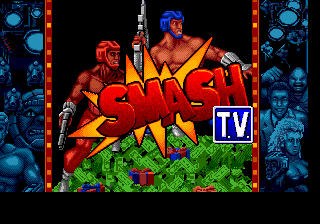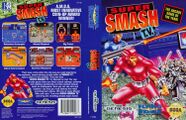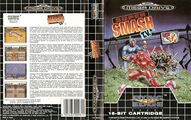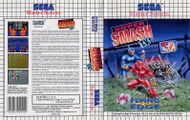Difference between revisions of "Smash T.V."
From Sega Retro
m (Text replace - " \[\[Category\:(1985 Master System Games|1986 Master System Games|1987 Master System Games|1988 Master System Games|1989 Master System Games|1990 Master System Games|1991 Master System Games|1992 Master System Games|1993 Master System Game) |
m (Text replace - " \[\[Category:(Mega Drive Games|1988 Mega Drive Games|1989 Mega Drive Games|1990 Mega Drive Games|1991 Mega Drive Games|1992 Mega Drive Games|1993 Mega Drive Games|1994 Mega Drive Games|1995 Mega Drive Games|1996 Mega Drive Games|1997 Mega) |
||
| Line 90: | Line 90: | ||
}} | }} | ||
| − | |||
| − | |||
| − | |||
[[Category:1992 Game Gear Games]] | [[Category:1992 Game Gear Games]] | ||
[[Category:Game Gear Games]] | [[Category:Game Gear Games]] | ||
[[Category:Game Gear Action Games]] | [[Category:Game Gear Action Games]] | ||
Revision as of 11:53, 7 May 2012
| Smash T.V. | |||||
|---|---|---|---|---|---|
| System(s): Sega Game Gear, Sega Master System, Sega Mega Drive, | |||||
| Publisher: Flying Edge, Flying Edge (US/EU), Acclaim (JP) | |||||
| Developer: Williams, Probe | |||||
| Genre: Action | |||||
| Number of players: 1-2 | |||||
|
Smash TV (スマッシュTV) is an arcade hit by Williams, first released in 1990.
The game was brought to a variety of platforms by Acclaim, including the Amiga, Amstrad CPC, Atari ST, Commodore 64, NES, Sega Game Gear, Sega Master System, Sega Mega Drive, SNES, and ZX Spectrum. It has recently been re-released on the Xbox Live Arcade service. The game was followed by a semi-sequel Total Carnage, which did not prove to be as successful.
The Sega Mega Drive and Super Nintendo ports were called Super Smash TV, though are essentially the same game and the title screens were left unchanged.
Johnny Cage from the Mortal Kombat series is said to have completed the Smash TV course.
Contents
Gameplay
Smash TV is very similar to Robotron 2084, in that the player is controlled by two joysticks. One joystick alters the player's movement, while the other alters the direction of weapon fire. The player must overcome numerous enemies that spawn from four sides of the screen, making sure not to be killed. It is set in the then future world of 1999, where extreme violence and death in game shows is considered acceptable and is highly popular among viewers. As such, the game takes place in a studio with a presenter, and various studio equipment can be seen when transitioning between rooms. To compensate for the danger, there are lots of expensive prizes to be won by contestants.
Problems arise in some console ports of the game due to a lack of controller buttons. The Sega ports for example have to make do with alternative control schemes as neither the Mega Drive, Game Gear or Master System have four firing buttons. With the default Mega Drive setting, ![]() will fire in the direction of the player,
will fire in the direction of the player, ![]() will fire in the opposite direction and
will fire in the opposite direction and ![]() will lock the firing direction until released. However, there is the option to play with two controllers, where player 1's D-pad handles movement and player 2's handles the shooting. Using this method means the game is restricted to single player.
will lock the firing direction until released. However, there is the option to play with two controllers, where player 1's D-pad handles movement and player 2's handles the shooting. Using this method means the game is restricted to single player.
Due to the awkward controller set-ups the Super Nintendo version is often seen as the superior console port, however both Nintendo copies are unable to render as many enemies on screen at once without slowdown, and do not retain the original music from the arcade version.
Physical Scans
Mega Drive Version
| Sega Retro Average | ||||||||||||||||||||||||||||||||||||||||||||||||||||||||||||||||||||||||||||||||||||||||||||||
|---|---|---|---|---|---|---|---|---|---|---|---|---|---|---|---|---|---|---|---|---|---|---|---|---|---|---|---|---|---|---|---|---|---|---|---|---|---|---|---|---|---|---|---|---|---|---|---|---|---|---|---|---|---|---|---|---|---|---|---|---|---|---|---|---|---|---|---|---|---|---|---|---|---|---|---|---|---|---|---|---|---|---|---|---|---|---|---|---|---|---|---|---|---|---|
|
| 64 | |
|---|---|
| Based on 18 reviews | |
Master System Version
| Sega Retro Average | |||||||||||||||||||||||||||||||||||||||||||||||||||||||||||||||||||||
|---|---|---|---|---|---|---|---|---|---|---|---|---|---|---|---|---|---|---|---|---|---|---|---|---|---|---|---|---|---|---|---|---|---|---|---|---|---|---|---|---|---|---|---|---|---|---|---|---|---|---|---|---|---|---|---|---|---|---|---|---|---|---|---|---|---|---|---|---|---|
|
| 43 | |
|---|---|
| Based on 13 reviews | |
Game Gear Version
| Sega Retro Average | |||||||||||||||||||||||||||||||||||||||||||||||||||||||||||||||||||||||||||||||
|---|---|---|---|---|---|---|---|---|---|---|---|---|---|---|---|---|---|---|---|---|---|---|---|---|---|---|---|---|---|---|---|---|---|---|---|---|---|---|---|---|---|---|---|---|---|---|---|---|---|---|---|---|---|---|---|---|---|---|---|---|---|---|---|---|---|---|---|---|---|---|---|---|---|---|---|---|---|---|---|
|
| 54 | |
|---|---|
| Based on 15 reviews | |
- ↑ 1700 igr dlya Sega, "" (RU; 2001-xx-xx), page 231
- ↑ Consoles +, "Janvier 1993" (FR; 199x-xx-xx), page 107
- ↑ Computer & Video Games, "November 1992" (UK; 1992-10-15), page 91
- ↑ GamePro, "September 1992" (US; 1992-xx-xx), page 54
- ↑ Joypad, "Octobre 1992" (FR; 1992-10-xx), page 75
- ↑ Sega Mega Drive Advanced Gaming, "December 1992" (UK; 1992-xx-xx), page 37
- ↑ Sega Mega Drive Advanced Gaming, "January 1993" (UK; 199x-xx-xx), page 94
- ↑ Mega, "October 1992" (UK; 1992-09-17), page 57
- ↑ Mega Fun, "09/92" (DE; 1992-09-22), page 39
- ↑ MegaTech, "October 1992" (UK; 1992-09-20), page 50
- ↑ Mean Machines Sega, "October 1992" (UK; 1992-09-xx), page 142
- ↑ Player One, "Décembre 1992" (FR; 1992-12-10), page 137
- ↑ Sega Power, "October 1992" (UK; 1992-09-03), page 38
- ↑ Sega Pro, "November 1992" (UK; 1992-10-08), page 56
- ↑ Sega Pro, "April 1993" (UK; 1993-03-11), page 68
- ↑ Sega Force, "October 1992" (UK; 1992-09-10), page 28
- ↑ Tricks 16 bit, "Tricks Sega Gold 800 igr" (RU; 1998-03-20), page 192
- ↑ Video Games, "12/92" (DE; 1992-11-23), page 62
- ↑ Computer & Video Games, "November 1992" (UK; 1992-10-15), page 90
- ↑ Mean Machines: The Essential Sega Guide, "" (UK; 1993-11-18), page 155
- ↑ Game Zone, "October 1992" (UK; 1992-09-24), page 42
- ↑ Hobby Consolas, "Noviembre 1992" (ES; 1992-xx-xx), page 158
- ↑ Joypad, "Octobre 1992" (FR; 1992-10-xx), page 156
- ↑ Joystick, "Octobre 1992" (FR; 1992-xx-xx), page 146
- ↑ Mega Force, "Octobre 1992" (FR; 1992-xx-xx), page 83
- ↑ Mean Machines Sega, "October 1992" (UK; 1992-09-xx), page 136
- ↑ Player One, "Décembre 1992" (FR; 1992-12-10), page 136
- ↑ Sega Power, "October 1992" (UK; 1992-09-03), page 40
- ↑ Sega Pro, "November 1992" (UK; 1992-10-08), page 57
- ↑ Sega Pro, "April 1993" (UK; 1993-03-11), page 72
- ↑ Sega Force, "November 1992" (UK; 1992-10-08), page 60
- ↑ Beep! MegaDrive, "July 1994" (JP; 1994-06-08), page 20
- ↑ Consoles +, "Décembre 1992" (FR; 1992-1x-xx), page 160
- ↑ Computer & Video Games, "May 1993 (Go! Issue 19)" (UK; 1993-04-15), page 14
- ↑ Electronic Games (1992-1995), "November 1992" (US; 1992-10-13), page 86
- ↑ Mean Machines: The Essential Sega Guide, "" (UK; 1993-11-18), page 169
- ↑ Famitsu, "1994-08-05" (JP; 1994-07-22), page 41
- ↑ Game Power, "Marzo 1993" (IT; 1993-0x-xx), page 85
- ↑ GamePro, "October 1992" (US; 1992-xx-xx), page 112
- ↑ Joypad, "Mars 1993" (FR; 1993-0x-xx), page 118
- ↑ Player One, "Mars/Avril 1993" (FR; 1993-03-10), page 114
- ↑ Sega Pro, "December 1992" (UK; 1992-11-12), page 49
- ↑ Sega Pro, "April 1993" (UK; 1993-03-11), page 75
- ↑ Sega Zone, "November 1992" (UK; 1992-10-28), page 27
- ↑ Sega Force, "February 1993" (UK; 1993-01-14), page 67
- ↑ Video Games, "12/92" (DE; 1992-11-23), page 132





